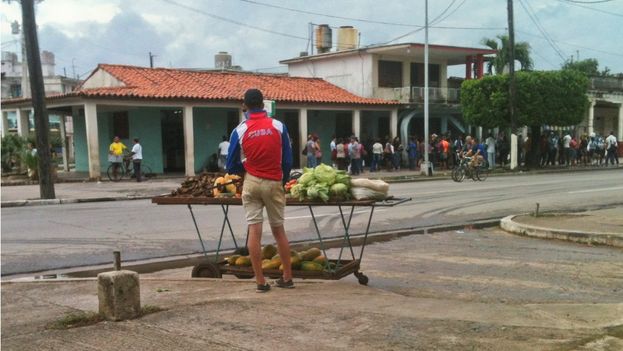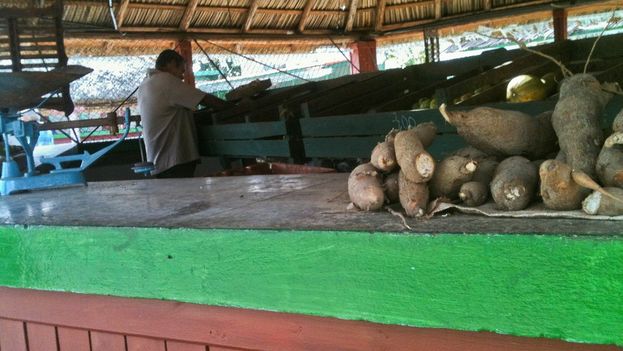
![]() 14ymedio, Juan Carlos Fernandez, Pinar del Rio, 1 February 2016 – The fragile commercial network in the city of Pinar del Rio is living in fearful times. The news of the police raids on vendors who sell fruits and vegetables from mobile carts in Havana and Artemisa has been enough to keep many of Pinar del Rio’s vendors from going out, for fear of being the next on the list for confiscations and fines.
14ymedio, Juan Carlos Fernandez, Pinar del Rio, 1 February 2016 – The fragile commercial network in the city of Pinar del Rio is living in fearful times. The news of the police raids on vendors who sell fruits and vegetables from mobile carts in Havana and Artemisa has been enough to keep many of Pinar del Rio’s vendors from going out, for fear of being the next on the list for confiscations and fines.
Earlier this year an experiment was launched in the province of Artemisa to impose price controls. The measure has also been implemented in dozens of markets in the Cuban capital and threatens to be implemented nationwide, and although some are relieved, others are suspicious.
The greatest fear among the Pinar del Rio produce vendors is that along with the fixed prices on products, there will be roadblocks on the highways against the delivery trucks, operations to limit the role of intermediaries, and excessive controls on the cart vendors who play an important role in distributing products in neighborhoods and villages.
In the city of Pinar del Rio, the State Agricultural Markets (MAE) do not currently compete with the private vendors because they have very little for sale and quality problems with what they do have. In statements to the local press, Jose Barrios Rodriguez, director of the Linea state market, commented that so far this year his market had received only 50,000 pounds of food.”
Yunier, a 22-year-old cart vendor, says that the markets are not going to be filled with food just because they implement greater controls against private sellers. “There is no production and it’s not our fault,” says the self-employed young man, who considers those like himself, who travel from street to street hawking their wares, “the weakest link in the chain.”
Of the 20,633 self-employed people in the province today, the most common activities are food sellers, landlords and cart vendors, followed by taxi drivers and construction workers.
Five years ago it was common to see these vendors with produce and grains providing house-to-house service with carts or tricycles.

Yosvel, 19, is one of them and gets up at dawn to collect his products brought in from the countryside and sell them on the centrally located Rafael Ferro Avenue, one of the many places where these kinds of vendors can be seen from the early hours. He is proud to have steady customers and doesn’t mince words when he says his products are “better than in the state markets.” The secret of his success? “My merchandise is good quality and I am honest with the weights.”
“The farmer sells me his pound of black beans at 12 Cuban pesos (CUP) and to earn something I have to sell it for at least 15 CUP,” Yosvel says, defending himself when asked about his high prices. The young man believes that “until the farmers own their own land and can grow and sell as they please, anything the government does is nothing more than a patch.”
In the afternoon of this same day, when the nimble vendor is still successfully selling his fruits and vegetables, the stands in the Linea state market are displaying just a few small onions, yucca and bananas, all very poor quality, and the employees are chatting with each other waiting for closing time.
“To find something here you have to come in the morning,” explains a market employee, adding that the supply trucks only bring “a little bit of everything and we run out before the rooster crows.”
The worker mouths off against Jose Ramon Machado Ventura, second secretary of the Communist Party and the most visible face behind the price controls.
“Why don’t they talk about prices in the shopping?” he protests, referring to the elevated prices in the state stores. He complains that he has never seen anything about that “in any newspaper or on the Roundtable TV show. They don’t talk about that,” he concludes.
